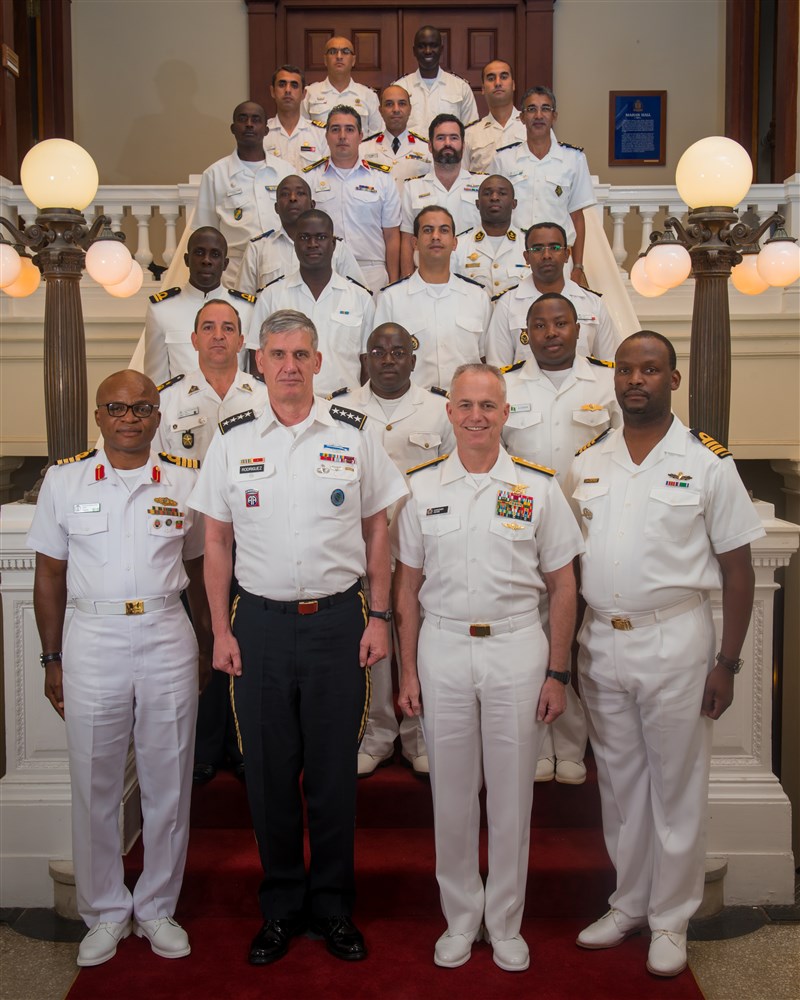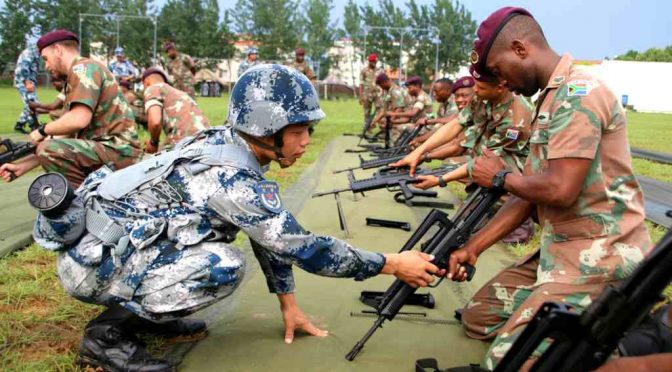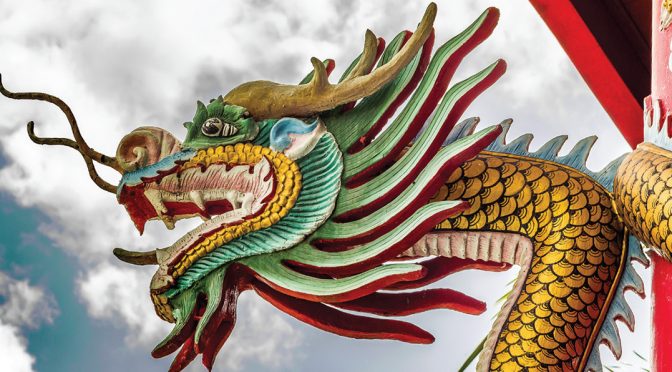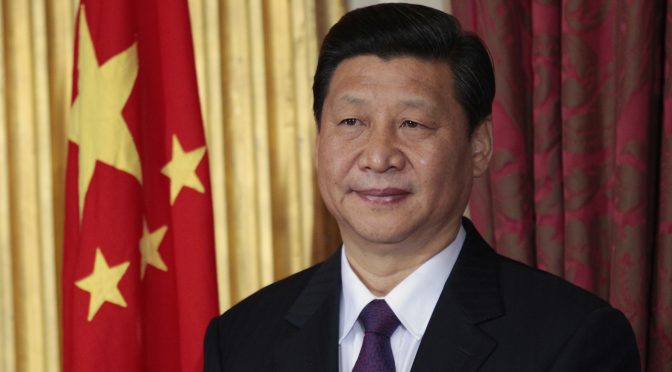By Matthew Quintero
“If not China, who?” was a question asked during a class on foreign investment in Africa. The speaker was an African naval officer. The class was equally composed of American and African military officers, and the place was the United States Naval War College (NWC). The African officers all seemed to nod in agreement while the rest of the room shrugged. The author has heard this comment several times before by other exasperated African officers. They were tired of being reminded that China was only interested in the natural resources of their homelands, or that China was building ports, bases, and infrastructure on loans their nations could hardly repay. They were also acutely aware that China’s “no strings attached” development targeted their weak governments and “big man” regimes. It was sometimes difficult for this particular officer to express himself, as English was his third language after Bantu and French. But on this day he made himself very clear, stating:
“All Africans want democracy. We all want to be like the United States. We need help with roads and infrastructure, but our governments cannot work with USAID and the World Bank. Who can the people get help from? If not China, who?”
In his mind, China was helping exactly where it mattered. The question of whether the U.S. or China invests more in Africa was irrelevant. This was a matter of sentiments and perceptions. If competition for the Indian Ocean during peacetime requires building partnerships with African nations, the U.S. will be best served by focusing on people rather than ports or platforms. But as it now trends, an entire side of the Indian Ocean in the form of east African nations is poised to embrace deeper strategic partnership with China.
Chinese Solutions to African Problems?
Like every other continent, Africa has problems. Africa has the youngest and fastest growing population in the world. By 2035, nearly half of all Africans will inhabit urban areas with poor infrastructure. These cities will struggle to provide their citizens with food, water, shelter, and employment. Africa’s GDP exponentially increased over the past decade due to the international scramble for its rich national resources. Yet with this remarkable rise in GDP, there has not been a corresponding rise in youth employment. Often when foreign investors come to Africa with a need for technical expertise they do not end up hiring African firms. This feeds a cycle of “brain drain” where Africans with scientific and technical degrees leave the continent for better employment elsewhere.
Climate change will also test urban infrastructure. Africa is warming at 1.5 times the global average. Flooding and rising sea level will continually impact the quarter of the continental population that lives within 60 miles of a coast. Climate change is estimated to cost Africa $50 billion per year by 2040. These struggling cities will also have to contend with the burden of displaced peoples.
Civil wars and ethnic struggles continue to foster Boko Haram in the West, Al Shabab in the East, and Al-Qaeda in the Maghreb. In their wake, “populations of concern” whether they be refugees, asylum seekers, or internally displaced persons, have greatly multiplied in the past decade. Porous land and maritime borders, along with government corruption, facilitate criminal activity. These extremist groups can then draw on public anger at government corruption to recruit and radicalize disenfranchised youth. This resentment is only made worse when police and military forces abuse local populations in their hunt for extremists.
Many of Africa’s woes are symptoms of government inability to react to the changing African environment. Managing the impact of foreign actors, population, climate change, violence, and economic growth will all depend on governance. According to the Ibrahim Index of African Governance, overall governance across the continent is on a marginally upward trend. The past decade has also seen a wave of democratic reform, in which six nations have voted to limit presidential terms along with improving decentralized governance. Yet, more than a quarter of Africa’s population has never seen a change in leadership. Coincident with this upward trend, African governments show increasing divergence in performance. Some governments are getting better, while others are getting worse.
The realization of the importance of “good governance” in Africa has created a dilemma for donor nations. Traditional sources of development such as the World Bank and the United States Agency for International Development (USAID) have safeguards built into their aid that are meant to stop or slow funding should the ruling governments use the aid for patrimonial purposes or in the violation of human rights. For many African nations, World Bank aid only comes with guarantees of democratic reform. Corrupt and oppressive regimes eventually refuse aid or refuse to change in order to qualify for aid. These same regimes often rule where infrastructure and other development projects are needed most. Should good governance or development come first? This chicken and egg dilemma is the topic of much current debate concerning international aid. And into this environment, China steps in.
As China’s need for commodities grows so does its involvement in Africa. China has invested heavily in Africa through the One belt, One Road initiative, and the Forum on Chinese-African Cooperation. With a policy of “noninterference,” Chinese development supposedly comes with “no strings attached,” meaning that China is ready and willing to work with corrupt African governments.
China is very effectively providing a counter-narrative to “western” international institutions. These ideas have most recently manifested in BRICS, the union of Brazil, Russia, India, China, and South Africa. BRICS members see themselves as leaders of the developing world and have their own agenda and development funds, liberated from restrictions placed on aid by the United Nations (UN), European Union (EU), and United States. This has worked very well for China. African nations are lining up to receive aid, and for their efforts, many Africans view China favorably.
But it would be unfair to say that Africans do not understand who they are dealing with. African civil society has criticized China for failing to promote good governance and human rights. For the African officers in certain war college classes, while they don’t necessarily like China, they don’t see development through the lens of great power competition. They see infrastructure projects increasing the quality of life within their nations. These projects just happen to be Chinese and not of some other foreign actor.
If not China, who will help? China wins over public opinion when they develop in nations with corrupt or weak governments. But Africa must have governments and societies able to resist both Chinese and U.S. influence, should that influence be malign. Capable democratic governments would be better equipped to handle their own problems and keep foreign actors in check. That is what the U.S. must strive for. To counter China in Africa, the U.S. must promote resilient, prosperous African states and not spheres of influence.
A Role for Foreign Military Education
In the parlance of Multi-Domain Operations, how does the U.S. compete with China for access to the East African coast? If the problem is governance, what role can the U.S. military possibly play? While debating these questions and government policies, international officers must ponder of the heated debates that occur in American war college classrooms. Americans often speak critically of the U.S. government, but could African officers speak critically of their own governments? Could these conversations ever occur in a Chinese war college?
The U.S. military can best compete with China for influence in Africa through foreign military education. Influence will come when African leaders see that good governance, respect for human rights, and abiding by international law is worth working toward. U.S. military leaders can work directly with African military leadership, specifically in war college settings where uniformed service meets free speech and critical thinking. More African officers training side-by-side with bright U.S. military officers and civilian professors is where the U.S. can reconcile ground truth with strategic aspirations.
Foreign military education focused on governance, accountability, and human rights is a small sliver of Defense Institution Building (DIB). DIB nests within Security Sector Reform (SSR), which falls under Security Sector Assistance (SSA). DIB, SSR, and SSA spheres overlap and funding for subordinate programs is held by both the Department of Defense (DoD) and the Department of State (DoS). Education of this sort currently falls under DoS’s International Military Education and Training (IMET) program. Among other objectives, IMET espouses a “respect for…democracy and…internationally recognized human rights.” IMET receives the least funding of all DoS global SSA efforts, and sub-Saharan Africa only receives 14 percent of funds allocated to Africa. IMET is also susceptible to only going to nations the DoS and DoD can agree on, rather than where it may do the most good. While the DoD is charged with administering IMET, DoS determines the recipients, and Congress controls the funding. DoD must be in “lockstep” with the DoS throughout the annual budget request process to ensure both departments needs are met.
DoD “Regional Centers for Security” (RC) can fulfill functions similar to IMET. The DoD budget for SSA significantly trumps that of DoS, but most of those funds are focused on the tactical training and equipping of partner militaries in their efforts to defeat transnational threats. RCs are the exception as they are DoD funded education tools serving regional combatant commanders. RC roles have expanded from “strengthening civil-military relations in democratic society” to “the promotion of democratic accountability” and “respect for human rights.” In a given year the DoD can train over twice as many foreign military personnel through RCs than DoS can through IMET. These programs are different, yet overlap toward the same objectives, and therein lies opportunity.

If more funding for education is untenable, the Gordian knot of SSA can be solved by more efficiently coordinating the education efforts of DoD and DoS. The DoD Inspector General summarized the situation well in reporting that “Without DIB policy that distinguished the DIB roles of…the Regional Centers or any other office or command conducting DIB-related efforts, a potential for duplication and inefficiency existed.” With the end goal of educating an entire military on international norms and good governance, RCs don’t necessarily target the required audience. IMET is intended for a wide audience of relatively young foreign officials. Conversely, RCs cater to a more selective group of senior foreign officers. However, as DoD initiatives, RCs are less vulnerable than IMET to political leveraging. IMET may be turned off due to political instability or coup attempts within the partner nation, which brings it back to the good governance versus development dilemma.
Foreign military education is of far greater importance and strategic potential than is currently realized, but these are often among the first types of programs to be cut from budgets. If for no other reason, the U.S. must address international military education because China is competing in this space as well.
China’s College of Defense Studies
The author would not have been aware of China’s competition in this space if it weren’t for African counterparts. Their story went something like this, “China has an international program too, but in China they teach us in our languages, we get a diploma, and a considerable stipend.” Every international student the author ever interacted with was extremely grateful for their opportunity to study at a U.S. war college, but this note about language is very important. Most African students at the Naval War College did not arrive with the requisite mastery of English to complete a master’s degree.
When they arrive in the U.S., the first stop for most international students is Lackland AFB in San Antonio, Texas. Here they attend the English language course at the Defense Language Institute. They are put through a rigorous program, but at least for certain African colleagues, most did not meet the standards of the language and writing screener when they checked into the Naval War College. Failing this test ensured that these students would only receive a certificate of completion and not the diploma that most other students received. Even a 25-week course in English may fail to prepare a Swahili speaker for an English-only graduate school accredited by the same source as nearby Harvard and Yale. However, if given enough time to communicate, most of these students had as much if not more to contribute to any conversation about global politics than U.S. students. As most classes were held in a fast-paced seminar setting, one could only wonder if they felt their statements could impact discussions.
Since 2012, China’s College of Defense Studies (CDS) has awarded war college master’s degrees to international students. CDS is a program within the Peoples Liberation Army National Defense University (PLA NDU) that provides a strategic and operational level defense education to international students. It caters to most officer ranks and just like the U.S. war colleges it is a year-long program that ends with a master’s degree. CDS specifically targets sub-Saharan Africa for potential enrollments, and courses are available in Chinese, English, French, Russian, and Spanish. And, just like the international programs at the U.S. war colleges, there are cultural tours and spouses clubs. But not everything is the same.
Unlike the U.S. war colleges, the international students are not well integrated with the greater PLA NDU student body. Alumni of CDS have been critical of the physical location of their school, which is in a completely different part of Beijing from the PLA NDU. This distance made interaction with Chinese counterparts very difficult. Alumni also report that much of the course incorporates China’s official view of the U.S. as a “neo-imperialist,” especially in Africa, and there is very little deviation from this official position in their discussion. The relative strength of U.S. international programs is found in these differences since international students in the U.S. are invited to explore the good and bad of American society. Compared to the U.S. system, China’s methods of physical separation and imposed ideology do not offer value when it comes to attracting favorable foreign sentiment.
Conclusion
Through enhanced professional military education, the U.S. can empower future African military leaders. Much like China’s College of Defense Studies, this U.S. program must also deliver an official party line and never deviate from that line, but that line must be democratic, open-minded, and inclusive.
To counter China in Africa the world needs resilient and empowered African states, not spheres of influence. Resilience is achieved when the African people believe in their governments, and in turn their governments are fair, accountable, and effective. So when an international student asks at an American War College, “If not China, who?” the answer must always be, “you.”
Lieutenant Commander Matthew Quintero, USN, is a Naval Flight Officer, E-2D Mission Commander, and recent graduate of the U.S. Naval War College. His views are his own.
Bibliography
Adams, Gordon, and Shoon Murray, editors. Mission Creep. Georgetown University Press, 2014.
“Africa at a Tipping Point – 2017 Forum Report.” Mo Ibrahim Foundation. Accessed July 15, 2019. http://s.mo.ibrahim.foundation/u/2017/09/14103424/2017-Forum-Report.pdf.
“China in Africa.” Council on Foreign Relations. Accessed July 15, 2019. https://www.cfr.org/backgrounder/china-africa.
“College of Defence Studies – Home.” National Defence University PLA China. Accessed July 15, 2019. http://www.cdsndu.org.
“Defense Language Institute English Language Center – Course Catalog.” DLIELC.edu – Home. Accessed July 15, 2019. http://www.dlielc.edu/prod/Catalog.pdf.
Hanauer, Larry, Christopher J. Springer, Chaoling Feng, Michael Joseph McNerney, Stuart E. Johnson, Stéphanie Pézard, and Shira Efron. Evaluating the Impact of the Department of Defense Regional Centers for Security Studies. Santa Monica: RAND Corporation, 2014.
McNerney, Michael J., Stuart E. Johnson, Stéphanie Pézard, David Stebbins, Renanah Miles, Angela O’Mahony, Chaoling Feng, and Tim Oliver. Defense Institution Building in Africa: An Assessment. Santa Monica: RAND Corporation, 2016.
Piombo, Jessica, editor. The US Military in Africa: Enhancing Security and Development?. Boulder: First Forum Press, 2015.
Van Oudenaren, John S., and Benjamin E. Fisher. “Foreign Military Education as PLA Soft Power.” Parameters 46, no. 4 (Winter 2017), 105-118.
“Whole of Government Security Cooperation Planning.” Defense Institute of Security Cooperation Studies. Accessed October 10, 2018. http://www.discs.dsca.mil/documents/greenbook/19_Chapter.pdf.
Featured Image: A Chinese paratrooper coaches his South African peers to use Chinese rifles during a recent tactical training exercise at a military training base in central China’s Hubei Province. (Photo courtesy chinamil.com.cn)




